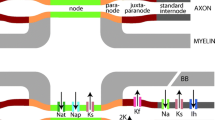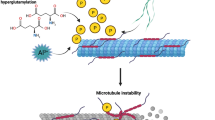Abstract
The effect of anti-tubulin antibodies present in the serum of a patient with a progressive sensorimotor neuropathy on microtubule assembly was examined. The patient’s serum was reactive on immunoblots with a single band of proteins of 55-kDa from homogenates of neural tissues. Tubulin was identified as the quantitatively major component of these 55-kDa proteins. Polymerization of tubulin in vitro was significantly enhanced by the patient’s serum. A monoclonal antibody to nerve-specific class III β-tubulin precisely duplicated the immunoreactive profile of the patient’s serum, while an antibody to class (I + II) β-tubulins also reacted with tubulins in non-neural tissues. The results indicate for the first time that human antisera reactive with nerve specific β-tubulin can alter tubulin polymerization-depolymerization dynamics.
Similar content being viewed by others
Author information
Authors and Affiliations
Additional information
Received: 20 June 1997 / Revised: 28 July 1997 / Revised, accepted: 29 October 1997
Rights and permissions
About this article
Cite this article
Stubbs Jr., E., Fisher, M. & Siegel, G. Anti-tubulin antibodies in a sensorimotor neuropathy patient alter tubulin polymerization. Acta Neuropathol 95, 302–305 (1998). https://doi.org/10.1007/s004010050802
Issue Date:
DOI: https://doi.org/10.1007/s004010050802




